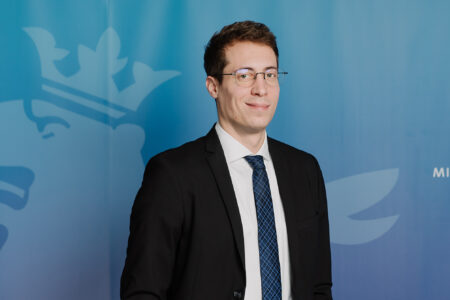Why are so many South Korean companies choosing Luxembourg?
Thierry Santer: The number of Korean companies in Luxembourg is indeed increasing, adding to the long-term presence of four major industrial players: Kiswire, Sam Hwa Steel, Hyosung and Solus Advanced Materials. The incorporations of the last few years notably include smart posture device specialist Neurabody (formerly Posture AI), smart window specialist Vsion, space ground station specialist CONTEC, artificial intelligence expert Data Design Engineering, public safety AI expert Safe AI and skills assessment and management software specialist Codepresso. We are in contact with many other Korean companies in fields such as space, cybersecurity, healthtech, fintech, AI, quantum computing and the data economy, which are evaluating a possible move to Luxembourg.
Luxembourg is an excellent entry point for technology-driven businesses as it provides easy answers to many of these questions.
 South Korean companies aiming to expand their business abroad traditionally looked at the US and Asian markets, but Europe is increasingly on their radar. However, coming to Europe is a challenge. Which country is the most suitable one? Which markets should be prioritised? Where are the first customers located? How should the different language environments be managed?
South Korean companies aiming to expand their business abroad traditionally looked at the US and Asian markets, but Europe is increasingly on their radar. However, coming to Europe is a challenge. Which country is the most suitable one? Which markets should be prioritised? Where are the first customers located? How should the different language environments be managed?
Luxembourg is an excellent entry point for technology-driven businesses as it provides easy answers to many of these questions. Companies coming here quickly realise that they are not bound to the Luxembourg market only, but can instantly address the larger European markets. Another obvious advantage are the language skills. Virtually everyone in Luxembourg speaks English which makes it much easier to navigate, especially in the beginning. Korean companies are also surprised to see how easy and quick it is to get in touch with high-level decision makers who are open-minded and willing to listen to businesses.
We can also see the impact of Fit 4 Start, Luxembourg’s most renowned accelerator programme that provides international startups with valuable insights into the European market. Two Korean startups have already participated in the programme, and a record number of 20 applications were submitted from South Korea to the 2024 edition. The entry into force of a bilateral Working Holiday Programme this year will further facilitate a move to Luxembourg for Korean nationals aged between 18 and 35.
Many of the companies coming to Luxembourg are part of the data economy. What links do you see between the two countries in this field?
Both South Korea and Luxembourg have recognised the potential of the data economy and are establishing the necessary infrastructure and environment where the power of data can be fully utilised. There are many opportunities for Korean companies to leverage Luxembourg’s infrastructure including its outstanding connectivity, cybersecurity expertise, secure data storage capacities and business-oriented supercomputer.
There are many opportunities for Korean companies to leverage Luxembourg’s infrastructure including its outstanding connectivity, cybersecurity expertise, secure data storage capacities and business-oriented supercomputer.
Several collaborations between the two countries are under way. The Luxembourg Ministry of Research and Higher Education recently signed a memorandum of understanding with the Korean Ministry of Science and ICT, which notably includes quantum computing in health data and data privacy and security. It might also lead to a second partnership connecting the Luxembourg Institute of Health with Korea’s National Cancer Centre and the City of Goyang. The Luxembourg National Research Fund and its Korean counterpart, the National Research Foundation, have also launched a research exchange pilot programme which will enable joint research projects in biomedical research and quantum technologies.
One advantage for cooperation is that Korean personal data protection regulations are deemed equivalent of EU regulations, so data can flow between the two countries without additional safeguards. In addition, Korea is set to join the Horizon Europe programme in 2025, which will provide Korean researchers and organisations with collaborative funding opportunities.
How do you support Korean companies?
The recently opened Luxembourg embassy and LTIO Seoul are the first contact points for Korean companies looking to expand their activities in Europe through Luxembourg. We are here to listen to their plans and needs, put them in contact with the right stakeholders in Luxembourg and make the process as easy as possible for them. We can provide them with customised information, organise onsite visits to Luxembourg, assist them with setting up a company and with joining startup support programmes, and guide them towards public and private funding opportunities. Our aim is to remain their trusted and accessible contact point throughout their whole journey.
An important point is that South Korea is also opening a resident embassy in Luxembourg.
An important point is that South Korea is also opening a resident embassy in Luxembourg. This will give further support to the Korean diaspora as well as to newly arriving entrepreneurs. There are also several Korean-speaking consulting firms in Luxembourg who help new arrivals bridge any initial culture and language barriers.
You have lived in South Korea for a year now. What do you like most about your new home country, and what do you miss from Luxembourg?
One of the most interesting and compelling aspects of Korea is the dynamic attitude of its entrepreneurs and investors. We meet many talented, innovative, inspired and inspiring people. Korea simply bubbles with opportunities and people are not shy to launch innovative businesses. Things move fast, but they are always carried out with care and accuracy. Two other things that I love are the food – it’s delicious! – and the opportunity to immerse myself in the rich Korean culture.
What I miss most from Luxembourg – besides friends and family – is switching between many different languages throughout the day. And I miss affordable apples!
Photo credits: Ministry of the Economy/Marion Dessard

